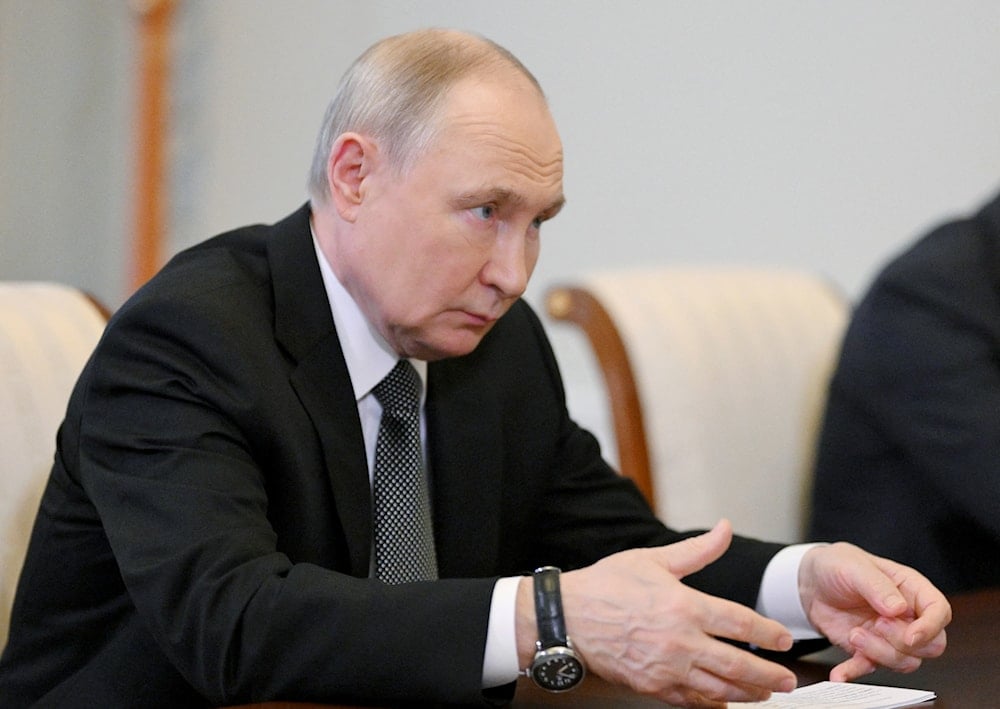Putin reveals Moscow conveyed ideas on resolving Israeli war on Iran
The Russian leader suggests his country could help ensure Iran's nuclear interests while addressing "Israel’s" concerns about security.
-

In this pool photograph distributed by the Russian state agency Sputnik, Russia's President Vladimir Putin meets the President of the New Development on the sidelines of the Saint Petersburg International Economic Forum (SPIEF) in Saint Petersburg on June 18, 2025. (Photo by Alexey DANICHEV / POOL / AFP)
Russian President Vladimir Putin on Thursday refused to discuss the possibility that "Israel" and the United States would assassinate Iranian Leader Sayyed Ali Khamenei.
Putin instead highlighted the unity of the Iranian people around their leadership amid the ongoing Israeli attack on the country.
Israeli Prime Minister Benjamin Netanyahu has openly speculated that "Israel's" military actions could result in regime change in Iran.
Meanwhile, US President Donald Trump claimed on Tuesday that the US knew the exact location of Sayyed Khamenei, but said that Washington would not pursue his assassination "for now".
Read more: Russia alarmed by Israeli aggression on Iran, sees limits: Bloomberg
Putin refuses to discuss possibility of Sayyed Khamenei's assassination
Asked what his reaction would be if "Israel", with US assistance, were to assassinate Sayyed Khamenei, Putin bluntly stated, “I do not even want to discuss this possibility. I do not want to.”
When pressed further, Putin maintained his stance, emphasizing that the political situation in Iran was much more complex and that Iranian society was consolidating around its leadership.
"We see that today in Iran, with all the complexity of the internal political processes taking place there...that there is a consolidation of society around the country's political leadership," Putin told senior news agency editors in Saint Petersburg.
Read more: Russia condemns Israeli attack, urges de-escalation
Putin calls for dialogue
Putin stressed that all sides should focus on finding ways to end hostilities.
He underscored the importance of respecting both Iran's right to peaceful nuclear energy and what he described as "Israel's right to the unconditional security."
The Russian leader reiterated his belief in dialogue as the best route to resolving the ongoing conflict.
"It seems to me that it would be right for everyone to look for ways to end hostilities and find ways for all parties to this conflict to come to an agreement with each other," he said. "In my opinion, in general, such a solution can be found."
As speculation about a potential US strike on Iranian nuclear and missile sites grows, Putin confirmed he has been in frequent communication with both Trump and Netanyahu.
Moscow conveys ideas on resolving crisis
Putin announced that during his talks with both sides, Moscow had shared its ideas on resolving the conflict, all while ensuring that Iran continues to have access to civil nuclear energy.
He suggested that Russia could help ensure Iran's nuclear interests while addressing "Israel’s" concerns about security.
The Russian president stressed that Moscow’s relationship with Tehran remained "very good", adding that his country could continue to support Iran’s peaceful nuclear program.
Russia had offered to take enriched uranium from Iran and provide nuclear fuel for its civilian energy needs.
"It is possible to ensure Iran's interests in the field of peaceful nuclear energy. And at the same time, to address Israel's concerns about its security," he said.
Read more: Kremlin says 'Israel' uninterested in mediation amid war on Iran
Iran did not request Russia's assistance
In a related context, Putin noted that Russia’s strategic partnership with Iran did not involve military cooperation, adding that Tehran had not formally requested weapons assistance.
His comments followed remarks by Russian Deputy Foreign Minister Sergei Ryabkov, who warned the US against striking Iran, stressing that such an action could destabilize the Middle East.
A spokesperson for the Russian Foreign Ministry also warned that Israeli strikes on Iranian nuclear sites risked triggering a nuclear catastrophe.

 4 Min Read
4 Min Read










